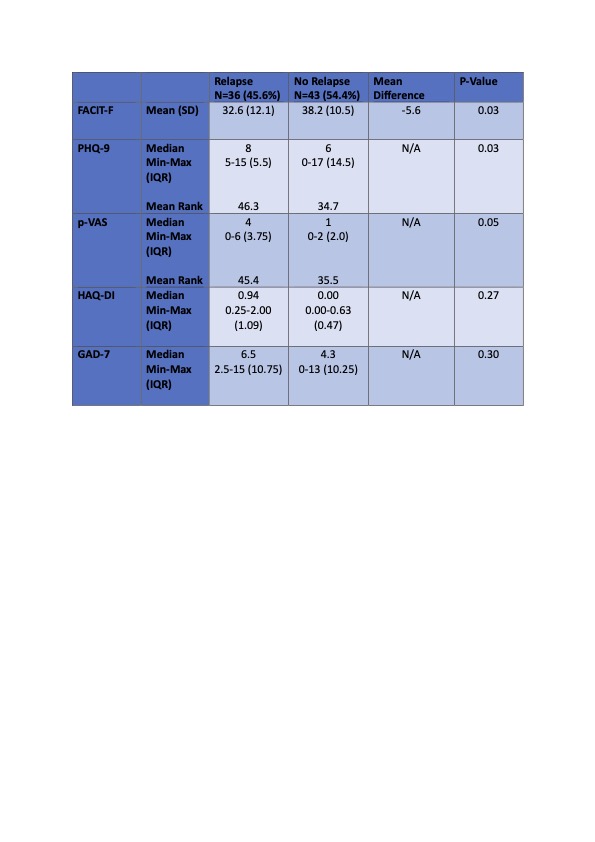Session Information
Session Type: Poster Session B
Session Time: 10:30AM-12:30PM
Background/Purpose: One of the most significant unmet needs in the management of those with Polymyalgia Rheumatica (PMR) is the lack of a disease stratification tool to guide therapy from disease outset. The aim of this study was therefore to explore baseline patient reported outcomes as potential prognostic factors for disease outcomes at one year in those with isolated PMR.
Methods: Participants, presenting to a fast track PMR clinic, with a new diagnosis of PMR (as per the provisional 2012 EULAR/ACR classification criteria) were recruited to this multicentre longitudinal cohort study,
At baseline, patient reported outcomes including fatigue using the Functional Assessment of Chronic Illness Therapy – Fatigue scale (FACIT-F), mood using the Patient Health Questionnaire(PHQ-9), anxiety using the Generalised Anxiety Disorder Assessment (GAD-7), pain (visual analogue scale (VAS)), and overall health related quality of life and disability using the Health Assessment Questionnaire-Disability Index(HAQ-DI) were collected from each participant.
Relapse was defined as a return in clinical symptoms, with an elevation in CRP and/or ESR necessitating, and responsive to an increase in glucocorticoid dosage. All analyses were conducted using SPSS (Version 29).
Results: 79 patients, 48.1 % (n=38) of which were female were included. 45.6% (n=36) of patients experienced disease relapse over the one year follow-up period.
There was a significant difference in mean rank between relapse and non-relapse patients PVAS score (p=0.05) and HAQ health status score (p=0.02) , with relapse patients having significantly higher scores. Relapse patients also had significantly lower FACIT-F scores (p=0.03), indicating a greater degree of fatigue. Interestingly, relapse patients had significantly lower PHQ-9 scores (p=0.03). There was no statistically significant difference between HAQ-DI (p=0.27) or GAD-7 (p=0.30) scores in those with relapse, and those without. Using ROC analysis, pVAS score demonstrated good sensitivity, specificity and predictive value, with an AUC of 0.85 (p=0.01).
Conclusion: In the quest to develop a disease stratification tool for those with PMR, our study findings emphasise for the first time, the importance of patient reported outcomes, in particular fatigue, pain and overall health scores. Further, large scale studies are required to develop a multimodal prediction model, including patient reported outcomes in order to stratify individual relapse propensity from disease outset for those with PMR.
To cite this abstract in AMA style:
Harkins P, Cowley S, McKittrick s, Harrington R, Kane D, Conway R. Role of Patient Reported Outcomes in Predicting Disease Relapse at One Year in Those with Polymyalgia Rheumatica [abstract]. Arthritis Rheumatol. 2024; 76 (suppl 9). https://acrabstracts.org/abstract/role-of-patient-reported-outcomes-in-predicting-disease-relapse-at-one-year-in-those-with-polymyalgia-rheumatica/. Accessed .« Back to ACR Convergence 2024
ACR Meeting Abstracts - https://acrabstracts.org/abstract/role-of-patient-reported-outcomes-in-predicting-disease-relapse-at-one-year-in-those-with-polymyalgia-rheumatica/

